During a recent visit to Sicily, at the "Tomato Demonstration Center" in Acate (RG), we had the opportunity to interview Patricio Corona (Commercial Operations Area Lead - Southern Europe) and Mauro Ferrari (Commercial Lead Italy), who both work for the Vegetable Seeds division of Bayer Crop Science. The two managers, who visited the island to attend a PomoDay and to meet customers from a region that is very important for the Italian tomato processing industry, focused on Bayer's commitment to innovation and research for the purpose of bringing benefits to farmers and with the goal of assisting them in growing their companies.
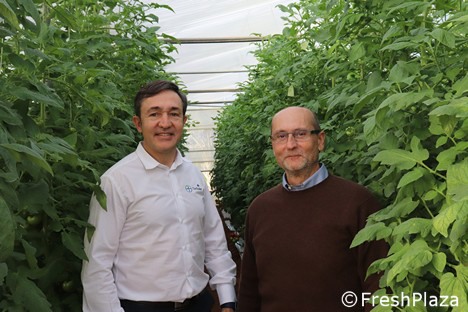 Patricio Corona and Mauro Ferrari
Patricio Corona and Mauro Ferrari
Freshplaza (FP): the sector has been in the grip of ToBRFV for years now. What are the losses in financial terms for the agricultural sector in Italy and around the world?
Patricio Corona (PC): I don't think anyone has accurate numbers on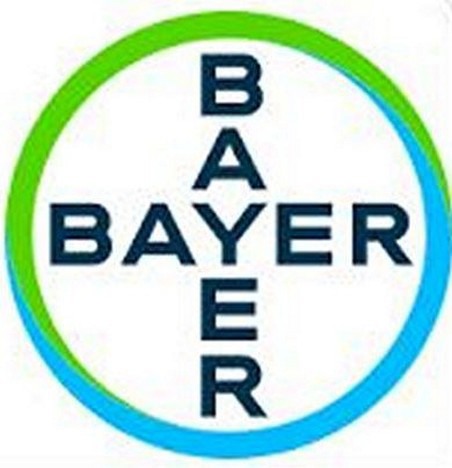 the impact of ToBRFV, and this is for several reasons. The first is that the phenomenon is not out of the picture yet. In Spain, for example, the virus is only emerging more strongly now; the other reason is that, in some cases, producers do not want to be exposed to the problem, fearing commercial repercussions. It is difficult to provide numbers. What we do know for sure is that the impact is really significant. We currently do not have reliable data, even in light of official numbers that we believe are somewhat incongruent, given the coexistence with other viruses that are mistaken for ToBRFV. The overall situation is mutually interconnected, with too many variables to have any absolute certainties. The differing factors are numerous. In the Netherlands, to take another example, the industry suffers from high energy costs. What is, therefore, the predominant reason for the reduction in production?
the impact of ToBRFV, and this is for several reasons. The first is that the phenomenon is not out of the picture yet. In Spain, for example, the virus is only emerging more strongly now; the other reason is that, in some cases, producers do not want to be exposed to the problem, fearing commercial repercussions. It is difficult to provide numbers. What we do know for sure is that the impact is really significant. We currently do not have reliable data, even in light of official numbers that we believe are somewhat incongruent, given the coexistence with other viruses that are mistaken for ToBRFV. The overall situation is mutually interconnected, with too many variables to have any absolute certainties. The differing factors are numerous. In the Netherlands, to take another example, the industry suffers from high energy costs. What is, therefore, the predominant reason for the reduction in production?
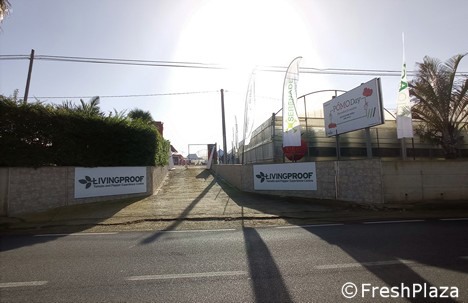 Livingproof, the "Tomato Demonstration Center" in Acate (RG)
Livingproof, the "Tomato Demonstration Center" in Acate (RG)
FP: Various seed companies have released several varieties with intermediate resistances, leaving producers particularly perplexed. What is Bayer genetics' response to the problem?
PC: We, too, have already introduced varieties with intermediate resistance in Mexico while still leaving our customers with a virus-fighting tool. At this stage, it is the only tool in our availability, and we are making it available to the industry, but the main thing is to maintain full transparency on what is being done. In fact, we are also working on HR, and because of the experience we have gained, we have the know-how to advance in this regard on genetics. We have also evaluated pre-existing varieties that, with their more or less pronounced susceptibility to the virus, have helped us take a snapshot of the situation, giving us important insights for scientific research. But the answer to the problem, as we wait for the solution that will come from genetics, is continuing to provide healthy seeds, which are always guaranteed. ToBRFV could lurk throughout the seed supply chain, however, and our protocols are precisely to ward off these possibilities. We are also working on rapid and reliable tests that cover the detection of mutations as well.
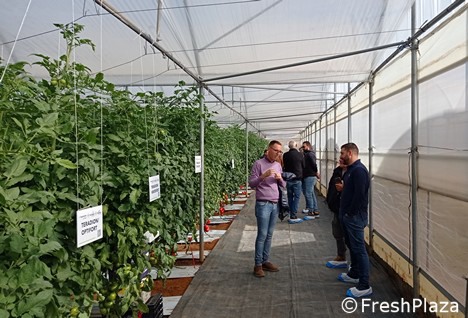 Inside a greenhouse at the Tomato Demonstration Center
Inside a greenhouse at the Tomato Demonstration Center
FP: Excluding ToBRFV, what is Bayer's commitment to research in supporting production, and how does it combine that with the sustainability of the environment and human health?
PC: One of the pillars of Bayer's business is precisely sustainability. The company has made a public commitment to the mitigation of gas emissions, with a number of steps that pertain not only to the cultivation of agricultural products but also to the way they are delivered to markets. Agriculture has certainly contributed to the emissions problem with its production processes, which must now become part of the solution. Alternatives must now be provided with genetic improvement, technology, and by minimizing the use of natural resources.
For example, a broccoli variety suitable for mechanical harvesting, or a melon that needs less water, or genetic resistance for varieties that allow less use of pesticides. In the field of digitization, we have implemented the FieldView Division for precision in agriculture using satellite images that accurately indicate the need for irrigation interventions or the use of pesticides. All of Bayer's Divisions are converging toward sustainability in an integrated way with each other, including for defense in the organic sector. We are even working with tomato processors, analyzing the carbon footprint to measure it in order to identify the link in the process on which to intervene most.
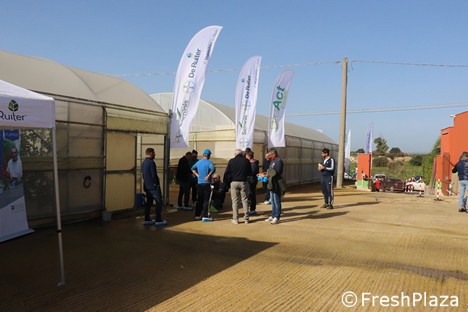 The Tomato Demonstration Center during one of the many activities that take place within it
The Tomato Demonstration Center during one of the many activities that take place within it
Bayer's commitment to technological innovation is also notable, especially for sustainable solutions adverse to telluric diseases. In short, a good harvest starts with healthy roots.
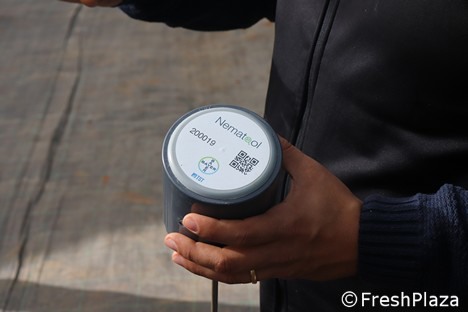 Nematool, the technological tool to manage nematodes
Nematool, the technological tool to manage nematodes
FP: One of your most recent and current projects is the R2S project. What is it about, and to what extent is Sicily affected? What are the investments in the area and the immediate impact on the sector?
Mauro Ferreri: Since the launch of R2S in Sicily, we have been trying to understand what benefits it could have on fruit and vegetables to find improvements for the benefit of the sector, thanks to technological tools such as Nematool that integrate rootstock management with information indicating the need to employ treatments with great precision and success. Hence, the integration of protection, genetics, and technology is an activity now considered essential in horticulture, thanks to the results obtained. Here, too, the optimization of pesticide use emerges with great effectiveness, plowing the path of increasing sustainability in field production processes.
The possibility of offering producers different solutions represents an enormous added value for the finished products and, at the same time, for the final consumers who can record a lower impact on the environment and have guaranteed quality and wholesomeness of the productions. On the other hand, Bayer's vision is reflected in a strategy that is based on health for all and hunger for none, also extending a hand to intensive production of other foodstuffs, which are necessary for food needs even in the most remote areas of the globe.
